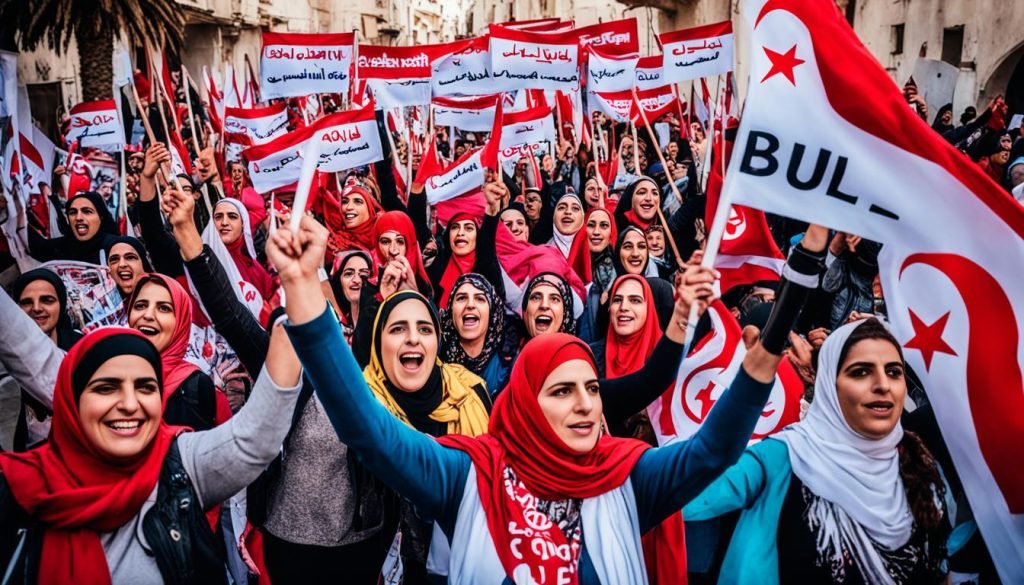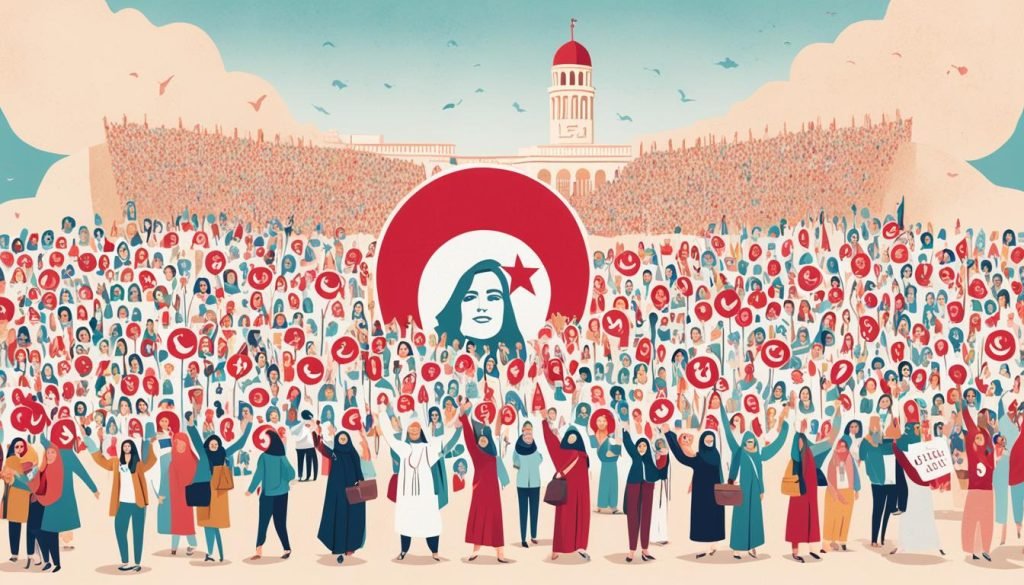The courage of Tunisian women stands out globally. Their journey in gaining the right to vote shines bright amid regional gender challenges. These strides towards equality in elections fill me with hope. Their story is more than just voting. It’s about empowerment and making their voices heard.
For true democracy, everyone must participate equally. The rise of women in Tunisia’s politics marks a win for global women’s rights. Society evolves as it welcomes women’s insights and leadership. Empowerment here is big. It’s about breaking free from old chains and creating equality for all.
When Tunisian women fought for their rights in the 20th century, it changed things. It wasn’t just about voting; it was about dignity and respect. Voting rights have since become symbols of their strength and independence.
This topic makes us think about the wider conversation on women’s rights around the world. Talking about women’s suffrage in Tunisia opens up a story many of us connect with, no matter where we come from.
Key Takeaways
- Women in Tunisia have been able to vote since 1957, showing the country’s progress towards women’s suffrage.
- The involvement of Tunisian women in politics shows the fight for gender equality in the region.
- Tunisian elections have become more inclusive, which promotes women’s empowerment politically.
- Though there are legal achievements, women’s rights in Tunisia still face challenges.
- Continuous effort is necessary to tackle these issues and strengthen women’s roles in Tunisian society.
Tunisian Women’s Evolving Role in Politics
I’ve been examining the role of Tunisian women in politics closely. Their journey represents both progress and present hurdles towards gender equality in politics. It all started in 1956 with a key law: the Code of Personal Status. This was a pivotal moment for Women’s political participation in Tunisia.
This law sparked reforms that transformed Tunisian women’s lives. It ended polygamy and repudiation, changing family life. It showed a commitment to Tunisian women’s empowerment. In politics, it paved the way for women to take on roles that men previously held.
The number of women in Tunisian parliament has been rising. By 2015, women made up 31.3% of the seats. This shows their hard work and growing influence. Look at the table below. It shows how Tunisian women’s representation has increased over the years:
| Year | Percentage of Women in Parliament |
|---|---|
| 2000 | 10.8% |
| 2005 | 16.2% |
| 2010 | 19.9% |
| 2015 | 31.3% |
These numbers are encouraging. But we shouldn’t ignore the ongoing challenges. The laws helping women aren’t always applied consistently. Also, there have been setbacks in women’s rights, amid broader issues in society.
Understanding Women’s political participation in Tunisia requires recognizing the big achievements and the steps still needed.
The recent issues haven’t erased Tunisian women’s significant progress. Their active political involvement offers a guiding light. It’s important for both Tunisia and the wider area, as they lead discussions on equality and representation.
Historical Milestones of Women’s Suffrage in Tunisia
The path to women’s rights in Tunisia is filled with key milestones. These have helped shape women’s status today. As a journalist, I see how laws and brave actions from leaders and groups have made a big difference.
The Code of Personal Status and Its Impact
In 1956, Tunisia introduced the Code of Personal Status. It was a groundbreaking law for Arab countries. It stopped polygamy and made sure marriage needed both people to agree. It set a minimum age for marriage too. This law started changes for women and led to more freedom for them.
Women’s Rights Under Bourguiba’s Regime
President Habib Bourguiba brought more changes that helped women. Under him, women got access to contraceptives by 1959. By 1973, they could choose to have an abortion. These changes gave women more control over their bodies.
During Bourguiba’s time, women’s rights flourished. Women could vote and work in jobs mostly done by men before. This period was crucial. It was about more than voting; it was about women being active in every part of life.
Reforms and Policies Under Ben Ali
Progress didn’t stop with President Zine El-Abidine Ben Ali. He pushed women’s rights further. Gender quotas got introduced, and a big change came in 1993. Then, Tunisian mothers could give their nationality to their kids, even if the dad was from another country.
But there’s more to the story than laws. The push for women’s rights also came from activists. In 1993, the Code of Personal Status was updated. It gave women more financial and marital independence, considering the culture. Thanks to many struggles, Tunisian women now enjoy many rights and freedoms.
Can Women Vote In Tunisia?
In Tunisia, the strides towards gender equality have been significant, especially in voting rights for women. Since 1957, Tunisian women have been voting legally. This was a big step right after getting independence. It marked the start of a new chapter for Women’s suffrage in Tunisia. Today, women in Tunisia are making their mark not just by voting. They also hold key positions in government, showing the Arab world how it’s done.
Tunisian women’s role in politics is continually growing, according to my research. Since President Habib Bourguiba’s time, Tunisia has made great progress. Bourguiba introduced changes that went beyond just voting. With the Code of Personal Status, Tunisia addressed issues like banning polygamy and ensuring women’s rights to divorce. These moves provided a solid base for women to stand equal in governance.
- Inception of Women’s suffrage in 1957
- Abolition of polygamy and initiation of rights to file for divorce under the Code of Personal Status
- Progressive increase in women’s representation in parliament
- Ongoing gender equality advancements in the political sphere
The road to equality, however, has faced many obstacles. Tunisia is making progress, but it’s not always smooth sailing. Women’s suffrage in Tunisia faces challenges like political unrest, policy changes, and implementation issues.
“Tunisia’s pioneering spirit in uplifting women’s political roles is a beacon of inspiration for the region, yet the path ahead demands vigilance and sustained effort to mitigate the obstacles that persist.”
Despite the laws supporting women’s political participation, applying these rights can be tricky. Therefore, it’s important to keep pushing for these rights. We need to ensure that the progress made is kept up, as Tunisia sets an example for the world.
Contemporary Challenges in Women’s Political Participation
Today, we face a crucial problem in politics, specifically the issue of gender equality in Tunisian elections. Even though we’ve made some progress, new obstacles for challenges in Tunisian women’s political participation have come up. These challenges sadly change the fight for gender equality in politics.
The Gender Gap in Modern Tunisian Elections
Recent changes in law have sadly increased the gender gap in elections. Even though gender quotas were created to help achieve equality, they were removed before the 2022 elections. This removal led to fewer women voting, highlighting the current difficulties Tunisian women face in politics.
Current Representation of Tunisian Women in Politics
It used to be a proud point that women made up a third of Tunisia’s parliament. Now, with recent policy changes, the promise of gender equality seems weak. Efforts like the 2017 anti-violence law aimed to help women face great challenges, showing that gender equality is still a distant goal.
| Electoral Cycle | Female Parliamentarians | Gender Quotas | Voter Turnout |
|---|---|---|---|
| 1st Cycle | 30% | Implemented | High |
| 2nd Cycle | 31% | Maintained | Stable |
| 3rd Cycle | 32% | Maintained | Stable |
| 4th Cycle (Post quota abolition) | TBD* | Abolished | Lowered |
*The final tallies subsequent to the legislative changes are yet to be determined.
The way Tunisian women are represented in politics is more than just numbers. It shows the health of our society and its democratic growth. The current state of women’s representation is a call to action to keep and protect the achievements so far.
The Journey Toward Gender Equality in Tunisian Elections
In studying Tunisian elections, it’s clear that the Code of Personal Status has been key. This legislation and the gender quotas have pushed for more rights for women. Yet, there’s still a long way to go to reach full equality.
The 2014 constitution brought hope with its focus on gender balance. But, the real test is seeing these ideals come to life in politics. There’s much work to be done to ensure women can fully participate.
As a Tunisian woman, the pursuit of political empowerment is not a mere item on a manifesto; it is a lived experience that demands equal representation and an equal say in the fate of our nation.
Gender quotas have changed the game for Tunisian women in politics. They’ve really made a difference. Let’s delve into the data to understand better:
| Year | Percentage of Women in Parliament Pre-Quota | Percentage of Women in Parliament Post-Quota |
|---|---|---|
| 2009 | 19.9% | N/A |
| 2011 | N/A | 26.7% |
| 2014 | N/A | 31.3% |
The table shows a clear rise in women’s participation after quotas were introduced. This has helped improve women’s rights in voting.
But, sticking to these new rules can be tough. Despite the hurdles, I will keep fighting for equal rights in our elections. It is vital for our democracy to reflect all its people.
- Perseverance in the face of wavering political will
- Continued advocacy for electoral gender quotas
- Strengthening of women’s political coalitions and networks
This journey is not just mine but belongs to every Tunisian woman seeking a say in our country’s future. Achieving gender equality in elections is about changing society to acknowledge all voices in Tunisia.
We aim for a future where gender equality is part of Tunisia’s core values. Every vote by a Tunisian woman stands for her ongoing struggle for equal rights and recognition.
It is not just about counting women in politics; it is about making women’s politics count.
Women’s Empowerment Movements and Their Achievements
In Tunisia, women’s empowerment movements have worked hard for rights. They have led major wins in the fight for gender equality. Their efforts have changed laws, showing how important they are for making progress.
“Our fight is for a society where women can live with dignity, free from violence and discrimination; where every woman and girl can unleash her full potential.” – Tunisian Women’s Rights Activist
These movements in Tunisia didn’t just change laws. They also made society stand together for equal rights for men and women.
Activism Leading to Legislative Reforms
Activism kick-started big legal changes, like the law against violence towards women in 2017. This law tackled marital rape and helped survivors better. It marked a big step forward in protecting women’s rights in Tunisia.
Another win was letting Tunisian women marry non-Muslim men. This showed Tunisia was becoming more inclusive and respected personal choices.

How Civil Society Organisations Support Women’s Rights
I’ve seen how hard civil society organisations work in Tunisia. They’re central to pushing for women’s rights. They provide training, funds, and platforms for global talks, which boosts the movement.
Women’s movements and civil organisations have teamed up to change society and policies in Tunisia. But, there are still hurdles, especially in enforcing laws for women’s rights. Despite this, the progress made promises a continued fight for women’s dignity and fair representation.
Tunisian Women in Leadership: Breaking the Glass Ceiling
Najla Bouden’s rise to Prime Minister is a huge step for Tunisian women leadership. It shows progress towards women’s empowerment in Tunisia. Yet, we must look deeper than the celebration of such achievements.
The real question is about the power and freedom these leadership roles hold. Are women truly empowered in Tunisia through these roles? Or are these positions just titles without real power?
To find answers, we should examine women’s roles across Tunisian society. Having more female leaders is a good sign. But it’s the real power they hold that will change society.
- Representation doesn’t automatically mean having influence.
- Women in leadership need real support and the right environment to succeed.
- The fight for female empowerment in Tunisia must keep going to secure meaningful roles for women.
Even though some barriers have been broken, challenges remain for new female leaders in Tunisia. To make real progress in Tunisian women leadership, we must go beyond just appointing women to positions.
| Year | Significant Milestone in Women’s Leadership | Impact on Female Empowerment |
|---|---|---|
| 2021 | Election of Najla Bouden as Prime Minister | This was a hopeful move for better governance. Yet, its true impact is still uncertain. |
| 2021 | Increase in female cabinet members | This shows progress but also sparks debate on the real impact of women’s political roles. |
These advances show great potential but remind us of the long road ahead. The future of Tunisian women leadership depends not just on these steps. It also relies on the actions and policies that support women in leadership for the long term.
International Perceptions vs. Domestic Realities of Tunisian Women’s Rights
As a professional copywriting journalist, I often explore the topic of gender equality worldwide. The international perceptions of Tunisian women’s rights view Tunisia as a leader in progressive values. But, looking at domestic realities of gender equality in Tunisia, we find a complex, conflicting story.
The global view of Tunisian women’s rights highlights female politicians’ symbolic roles. But this portrayal doesn’t fully match the inside story, where the fight for equality is ongoing. Let’s look more closely at these differing pictures.
The Role of Female Politicians in Shaping Global Views
Abroad, Tunisian female politicians promote women’s rights progress. However, their true impact seems limited by domestic political constraints. Their international presence often masks the deeper social challenges blocking real equality at home.
Critical Analysis of Progress on Women’s Rights in Tunisia
The path to rights for Tunisian women fluctuates with political changes. The reign of President Kais Saied, in particular, raises concerns among activists. The fear is that recent policies might weaken past equality efforts, showing a gap between international perceptions and domestic realities of gender equality in Tunisia.
| International Recognition | Domestic Legislation | Reality on the Ground |
|---|---|---|
| Praised for progressive gender policies | Legislation favouring gender equality | Persistent socio-economic gender disparities |
| Female politicians as global representatives | Constitutional reforms for women’s rights | Challenges in actual policy implementation |
| Tunisia seen as a model for women’s rights in Arab world | Commitment to equality in the public sphere | Reports of diluting previous gender parity gains |
In exploring this topic, it’s clear that while Tunisia gets praise internationally, the reality at home is different. The struggle for women’s rights is ongoing. The achievements so far are notable but vulnerable. The road ahead for women’s rights in Tunisia calls for constant vigilance and support.
Assessing the Legal Framework: Progress and Setbacks
The story of legal changes for women’s right to vote in Tunisia shows both progress and challenge. The Code of Personal Status has been key for gender equality in Tunisia for years. It’s a landmark for women’s rights not just in Tunisia, but across the Arab world.

Analysis of Tunisia’s Legal Reforms on Women’s Suffrage
In exploring Tunisia’s laws, we see a mix of tradition and modernity. This has opened doors for women. From having no say, women now play key roles in politics. Yet, recent changes in laws show uncertain times ahead, risking the gains made.
The Consequences of Constitutional Changes on Women’s Voting Rights
Amendments to the constitution are changing the support for equal rights. These changes are shaking the foundation of legal advances in women’s voting rights in Tunisia. The risk to gender quotas in government is a major concern. It makes us question the future of women’s rights in Tunisia’s government.
Here’s a quick look at important legal steps and their effect on Tunisian women in politics:
| Year | Milestone | Impact on Women’s Rights |
|---|---|---|
| 1956 | Enactment of the Code of Personal Status | Established the basis for gender equality |
| 1957 | Women granted the right to vote | Empowerment of women in political participation |
| 2011 | Introduction of gender parity in electoral lists | Increased women’s representation in parliament |
| 2014 | New constitution strengthens commitment to gender equality | Further solidifies legal foundation for women’s suffrage |
| 2020s | Changes to constitutional text regarding gender parity | Risks undermining previous advances in women’s rights |
People both supporting and questioning gender equality are watching Tunisia closely. The future of women’s right to vote will surely be shaped by legal changes. These changes will also impact women’s rights in Tunisia.
Celebrating Tunisian Women: National Days and Symbolic Actions
In my experience, Tunisian National Women’s Day deeply honors the progress in celebrating women in Tunisia. Launching on August 13 each year, it marks the start of the Code of Personal Status. This code was a big step towards gender equality. It’s amazing how Tunisia blends history with today, keeping achievements lively and real.
The essence of this day shines in public statements and legal changes.
For instance, in 2017, the celebrated announcement allowed Tunisian Muslim women to marry non-Muslims. This move showed Tunisia’s growth, aligning with global values of equality and freedom.
Reflecting on celebrating women’s achievements in Tunisia, International Women’s Day on March 8 also holds deep meaning. It acknowledges progress and guides further advancements for women in various life aspects.
- Commemorative events showcase Tunisian women’s talent and determination.
- Public discussions and forums encourage talks on enhancing women’s societal roles.
- Cultural displays and exhibitions recount stories of women’s efforts and victories.
However, these dates are more than just celebrations. They remind us of the ongoing work. Every Tunisian National Women’s Day renews our vow. It’s a pledge to celebrate and elevate women’s achievements in Tunisia further.
Conclusion
The story of women’s voting rights in Tunisia is inspiring and teaches us a lot. It shows a journey of strength and gaining power. This journey reflects the nation’s wish for gender equality. As I think about the history of women in Tunisian politics, it’s clear the Code of Personal Status played a key role. This law helped women vote and take on government roles.
Tunisian women faced tough times but kept fighting for their rights. They worked hard to make laws better for women’s rights in the country. While they made great progress in politics, some issues, like policy changes, have threatened their achievements. But, the hard work and determination of Tunisian women are truly amazing.
Looking forward, the fight for gender equality in Tunisia depends on sustained efforts. These efforts must make sure laws that support women are really put into action. Challenges are still there, but there’s ongoing progress. This progress is a key moment in Tunisia’s history. It promises to strengthen and change the role of women in Tunisia’s future.







